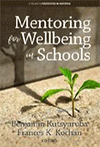
Mentoring for Wellbeing in Schools
Edited by:
Benjamin Kutsyuruba, Queen’s University
Frances K. Kochan, Auburn University
A volume in the series: Perspectives on Mentoring. Editor(s): Benjamin Kutsyuruba, Queen’s University.
Published 2024
This volume of the Perspectives on Mentoring Series explores the role of mentoring in promoting wellbeing of both mentees or proteges and mentors in K-12 school settings. At its core, mentoring is about helping, advising, supporting, and guiding mentees and proteges to gain a wide variety of skills, abilities, and/or attributes. Another outcome of mentoring, less often discussed, is the positive impact it can have on the mental health and wellbeing of both the mentor and mentee. Of particular interest for this edited volume is how mentoring can promote mental health, build resilience, and develop capacity to maintain and sustain emotional, psychological, and social wellbeing for all in the K-12 school settings. The notion of wellbeing, in general, includes both hedonic aspects of feeling good (positive emotions) and eudemonic (conducive to happiness) aspects of living well that entail experiences of positive relationships, meaningfulness in life and work, senses of mastery and personal growth, autonomy, and achievement.
This edited volume expands and adds to the existing literature on mentoring in schools, by offering a collection of works that examine the connection between mentorship and wellbeing. This volume includes chapters that describe effective mentoring for wellbeing, detail positive approaches to mentoring youth, offer recommendations for growing the wellbeing of pre-service teachers, early career teachers, and mid-late career teachers, illustrate approaches to growing a community of educators through mentoring and developing teacher leaders as agents of change and facilitators of wellbeing, and discuss studies and models for nurturing and promoting wellbeing among and through school leaders in national and international settings. Through these chapters, authors advocate for greater attention to how to support and nurture wellbeing as central to mentorship efforts in K-12 school settings.
ENDORSEMENTS:
"Mentoring for Wellbeing in Schools shines light on wellbeing in studies of mentoring in K–12 education. This collection provides researchers, practitioners, and policymakers alike with a rich array of wellbeing in mentoring relationships—not as an add-on feature of mentorship but rather an essential aspect of mentors’ support and role. As demonstrated from various perspectives, a culture of wellbeing in schools has multiple benefits for people and organizational cultures, including teacher and leader preparation. Readers, especially those concerned with the flourishing of schools in a pandemic world, will walk away better prepared to make mentoring work." — Carol A. Mullen, Virginia Tech
"Effectively marshalled by Kutsyuruba and Kochan, respected international authorities on mentoring, the authors provide a wealth of examples and guidance on much-needed means of promoting wellbeing and human flourishing in schools. Given the vast number of threats and impediments to the wellbeing of students, trainee teachers, established teachers, and principals worldwide, this work is extremely timely. Arguably, it should be compulsory reading for school principals, mentors, teacher educators, mentor trainers, education researchers in these spaces, and – perhaps more importantly – anyone who holds public office and makes or has the capacity to influence decisions which impact the work of school teachers and principals." — Andrew J. Hobson, University of Brighton, UK
CONTENTS
-
Paperback979-8-88730-530-1
Web price: $45.04 (Reg. 52.99)
-
Hardcover979-8-88730-531-8
Web price: $80.74 (Reg. 94.99)
- eBook979-8-88730-532-5

- EDU059000 - EDUCATION: Teacher & Student Mentoring
- EDU038000 - EDUCATION: Student Life & Student Affairs
- EDU014000 - EDUCATION: COUNSELING: Academic Development
-
 Across the Domains
Examining Best Practices in Mentoring Public School Educators throughout the Professional Journey
Across the Domains
Examining Best Practices in Mentoring Public School Educators throughout the Professional Journey
-
 Best Practices in Mentoring for Teacher and Leader Development
Best Practices in Mentoring for Teacher and Leader Development
-
 Creating and Sustaining a Collaborative Mentorship Team
A Handbook for Practice and Research
Creating and Sustaining a Collaborative Mentorship Team
A Handbook for Practice and Research
-
 Mentoring at Minority Serving Institutions (MSIs)
Theory, Design, Practice, and Impact
Mentoring at Minority Serving Institutions (MSIs)
Theory, Design, Practice, and Impact
-
 Mentoring for the Professions
Orienting Toward the Future
Mentoring for the Professions
Orienting Toward the Future
-
 More Than a Mentoring Program
Attacking Institutional Racism
More Than a Mentoring Program
Attacking Institutional Racism
-
 Uncovering the Cultural Dynamics in Mentoring Programs and Relationships
Enhancing Practice and Research
Uncovering the Cultural Dynamics in Mentoring Programs and Relationships
Enhancing Practice and Research

